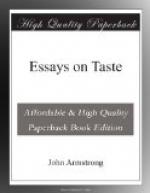In matter of taste, the public, for the most part, suffers itself to be led by a few who perhaps are really no judges; but who, under the favour of some advantages of title, place, or fortune, set up for judges, and are implicitly followed even by those who have taste. These washy dictators have learnt at school to admire such authors as have for ages been possessed of an indisputed renown: but they would never have been the first to have discovered strokes of true genius in a co-temporary writer, though they had lived at the court of AUGUSTUS or of Q. ELIZABETH.
So undistinguishing is our taste, that if the most torpid dunce this fruitful age can boast of, could by some artful imposture prepossess the public, that the most insipid of all his own bread-sauce compositions, to be published next winter, was a piece MILTON’s, or any other celebrated author, recovered from dust and obscurity, it would be received with universal applause; and perhaps be translated into French before the town had doated six weeks upon it. One might venture to say too, that if a work of true spirit and genius was to be introduced into the world, under the name of some writer of low reputation, it would be rejected even by the greatest part of those who pretend to lead the taste. And no wonder, while an eminent vintner has mistaken his own old hock at nine shillings the bottle for that at five.
OF WRITING TO THE TASTE OF THE AGE.
Whatever some have pretended, one may reasonably enough doubt whether ever an author wrote much below himself from any cause but the necessity of writing too fast. When this happens to a writer who, with the advantages of leisure and easy circumstances, is capable of producing such works as might charm succeeding ages, it is a disgrace to the nation and the times wherein such a genius had the misfortune to appear.
It belongs to true genius to indulge its own humour; to give a loose to its own sallies; and to be curbed, restrained and directed by that sound judgment alone which necessarily attends it. It belongs to it to improve and correct the public taste; not to humour or meanly prostitute itself to the gross or low taste which it finds. And you may depend upon it, that whatever author labours to accommodate himself to the taste of his age—suppose it, if you please, this present age—the sickly wane, the impotent decline of the eighteenth century: which from a hopeful boy became a most insignificant man; and for any thing that appears at present will die a very fat drowsy block-head, and be damned to eternal infamy and contempt: every such author I say, though he may thrive as far as an author can in the present age, will by degrees languish into obscurity in the next. For though naked and bare-faced vanity; though an active exertion of little arts, and the most unremitting perseverance in them; though party, cabal, and intrigue; though accidental advantages, and even whimsical circumstances; may conspire to make a very moderate genius the idol of the implicit multitude: works that lean upon such fickle props, that stand upon such a false foundation, will not be long able to support themselves against the injuries of time. Such buildings begin to totter almost as soon as their scaffolding is struck.




